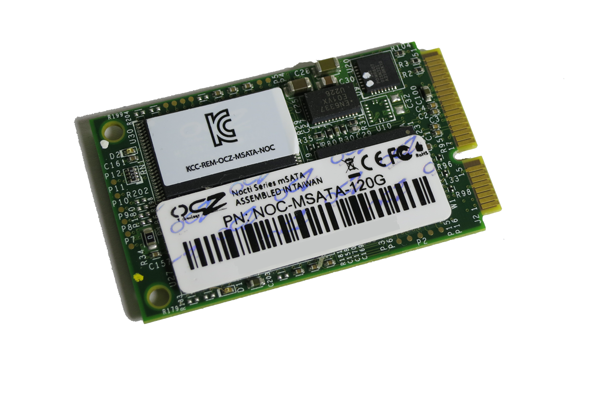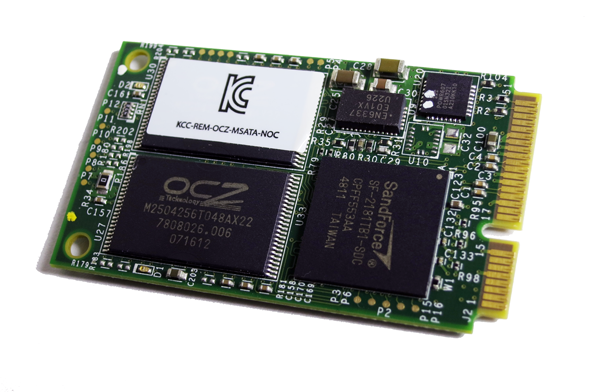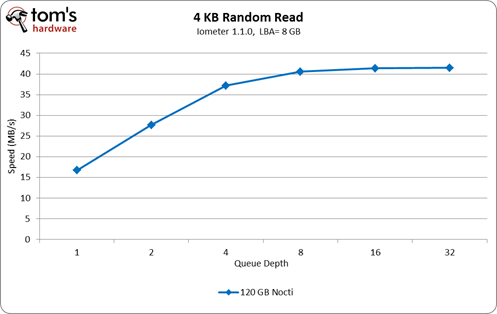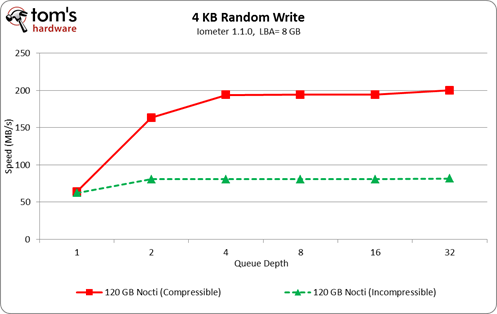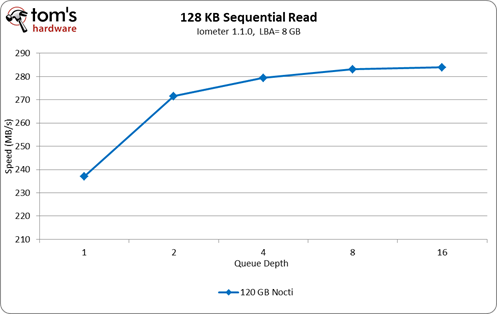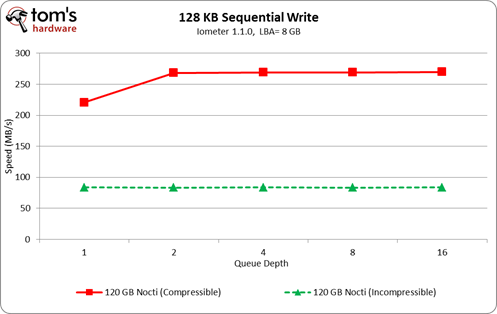Round-Up: 10 mSATA SSDs From Adata, Crucial, Mushkin, And OCZ
Get Tom's Hardware's best news and in-depth reviews, straight to your inbox.
You are now subscribed
Your newsletter sign-up was successful
OCZ Nocti mSATA SSD
OCZ sells a great many 2.5" SSDs, but it only has one mSATA offering called the Nocti. You'll want to keep in mind that it's an older design, which is why it's specifications are mismatched against the Adata, Crucial, and Mushkin contenders in our round-up. Nevertheless, you can still buy Nocti drives online. In some cases they're even more expensive than the competition. So, it's important that we include the Nocti in our benchmark results.
Notice that OCZ is using a second-generation SandForce controller on its sole mSATA-based SSD. On paper, that'd give it the chops needed to hold its own in testing.
However, we can also see that the company is leaning on TSOP packaging. Unlike the BGA modules used by Adata, Crucial, and Mushkin, these TSOP packages communicate over a single channel each. An mSATA drive with four packages is only utilizing half of what the SandForce controller has available. And that's why OCZ only rates the drive for sequential reads of up to 280 MB/s and writes as high as 260 MB/s.
Now you see just how dire the Nocti's disadvantage is. That it's still selling for as much as some of the competing drives out there really doesn't make sense.
In lightweight storage workloads, where the Nocti is faced with a queue depth of one, it's actually just as fast as the higher-end SSDs we're testing. It's even competitive at a queue depth of two. But when you start stacking I/O operations, it quickly falls behind. Fortunately for OCZ, most mobile and mainstream desktop applications are not storage intensive. Even still, at the same price (or less), we'd rather spring for the SSD able to utilize all eight of the SandForce controller's channels.
Writes (particularly writing incompressible data) are dismal compared to the Adata and Mushkin drives. Whereas the 120 GB Nocti tops out around 80 MB/s, those two competitors exceed 150 MB/s.
Sequential reads and writes are also pretty bad in comparison to the XPG SX300s and Enhanced Atlases.
Get Tom's Hardware's best news and in-depth reviews, straight to your inbox.
At least, that's in theory. Iometer workloads are fairly synthetic, mostly useful for validating manufacturer specifications. Moving on to more real-world testing should help us determine whether OCZ's spec sheet-based disadvantage is something you'd need to worry about in day-to-day use.
Current page: OCZ Nocti mSATA SSD
Prev Page Mushkin Enhanced Atlas mSATA SSDs Next Page PCMark 7 And Power Consumption-
trumpeter1994 I just got a 256GB Crucial m4 msata SSD for the laptop I'm typing from. I love the thing its so nice to have in my y580Reply -
weatherdude Nice to see mSATA SSD's performing so well. Looks like laptops can now benefit from SSD's without having to compromise on storage space by giving up HDD's.Reply
Also the award is something new. I guess the "Recommended" and "Approved" awards are gone for 2013? -
cangelini weatherdudeNice to see mSATA SSD's performing so well. Looks like laptops can now benefit from SSD's without having to compromise on storage space by giving up HDD's.Also the award is something new. I guess the "Recommended" and "Approved" awards are gone for 2013?Approved is still one of the awards we're using. Recommended Buy is replaced by Smart Buy to better-convey the emphasis on value, and Best Of is replaced by Elite to better convey the emphasis on "this is the best damn product in the segment that we can recommend." Elites will continue to be something you rarely ever see, except when we want to make a point to honor a piece of hardware.Reply -
abbadon_34 Seems kinda underwhelming, seeing only 4 in the market, 2 of them years old. Ironically puts Intel's SSD and OCZ's in the same boat.Reply -
tsnor Excellent article. Nice. Much better than typical.Reply
Some discussion of trim, and the effects of using drives with a few days of use would have been good. The assumption is that the 'clean drive' performance tested is a good indicator of what people will see when they've used the drive for a month needs to be tested, the perforamnce order might change sharply. A 6 hour random write workload would go a long way to showing what to expect. Especially given the broken TRIM on SF 5 firmware and the slow speed of the fixes to existing SF drives. -
jaquith Yep, no argument the Crucial m4 mSATA 256 GB stole the show. It's both the fastest & cheapest -- what's the catch? I hope none.Reply
BTW - $179.99 or $0.70/GB (Promo Code: EMCYTZT2757) NewEgg - http://www.newegg.com/Product/Product.aspx?Item=N82E16820148613 Just noticed the sale from a NewEgg email. -
Onus I've got a 256GB Crucial M4 in the little clip on my Maximus V Gene as the boot drive. It's been performing flawlessly there for months.Reply
That's a bit crazy I know, but I had originally had it on the underside of an AZRock Z77E-ITX board until that board died. -
sna May I ask why is the Samsung 830 msata drive not present in this review?Reply
as I recall it outperforms the M4 and all the drives here.
-
edlivian oh great, now newegg and crucial are going to jack up the prices on the m4 line.Reply
I love the m4 drives, but now its going to get too much attention. -
jacobdrj snaMay I ask why is the Samsung 830 msata drive not present in this review?as I recall it outperforms the M4 and all the drives here.Because they are pretty much EOL with the 840 series out.Reply
I want to know when AMD laptops are going to start including msata slots... It is the budget laptop guys that would get the best benefit from msata with a standard HDD together...
